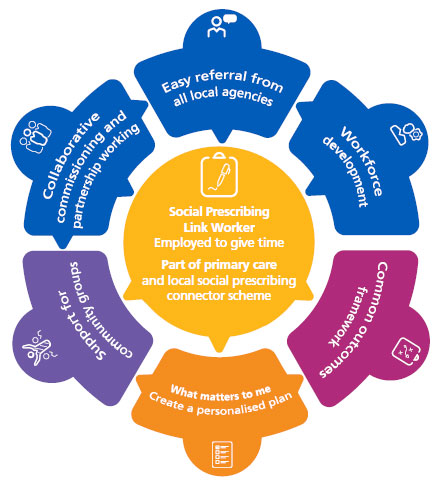Greater Manchester’s Dementia Care Pathway
QUALITY STANDARDS
People with dementia who develop symptoms that cause them significant distress, or develop behaviour that challenges us (BtC), are offered an assessment at an early opportunity to establish generating and aggravating factors.
For extra information, evidence and best practice please scroll down to the bottom of the page.
Priority
:
Required
Should
Ambition
Suitable social and peer support groups are locally available for people living with dementia and carers.
For extra information, evidence and best practice please scroll down to the bottom of the page.
Priority
:
Required
Should
Ambition
Fostering a dementia friendly society is inclusive and accessible for all
In a dementia-friendly society people will be aware of and understand dementia, so that people with dementia can continue to live in the way they want to and in the community they choose.
For extra information, evidence and best practice please scroll down to the bottom of the page.
Priority
:
Required
Should
Ambition
Enabling the person with dementia and their family in managing their own health and care, adopting a number of strategies and accessing resources.
For extra information, evidence and best practice please scroll down to the bottom of the page.
Priority
:
Required
Should
Ambition
People with dementia and carers are enabled to access music in a number of settings, at all stages of the Dementia Well Pathway.
Music has a valuable role to play in enhancing quality of life for people living with the syndrome, and their carers. It has the power to bring people together in the here and now, providing a way to stay connected with loved ones and carers through shared experiences.
It can enliven, stimulate and enable people to express themselves creatively beyond words. This involvement enables people to be seen for who they are beyond their diagnosis.
For extra information, evidence and best practice please scroll down to the bottom of the page.
Priority
:
Required
Should
Ambition
Appropriate assistive technology should be explored and offered for those whom it may benefit.
A referral can be made to social services to access the assistive technology available to you. An appointment with an occupational therapist will help to understand what changes and adaptations might help you, and the therapist will create a detailed personal plan for your needs.
For extra information, evidence and best practice please scroll down to the bottom of the page.
Priority
:
Required
Should
Ambition
Earlier diagnosis and interventions post diagnosis, will enable people to live more independently for longer.
Health and social care professionals should act on reports or observations of symptoms to facilitate early diagnosis. Once diagnosed, people with dementia should be offered interventions and not have to wait until their symptoms worsen.
For extra information, evidence and best practice please scroll down to the bottom of the page.
Priority
:
Required
Should
Ambition
People with dementia and carers are enabled to access and connect to Social Prescribing offers and/or community based support.
Social prescribing is used where people can live better by improving social and environmental aspects of their lives. For example, social prescriptions might encourage people to live better by being active in their local community by volunteering, befriending or doing activities provided by community organisations.

For extra information, evidence and best practice please scroll down to the bottom of the page.
Priority
:
Required
Should
Ambition
Psychosocial therapies for improving and maintaining cognitive functioning should be offered to those living with with mild-to-moderate dementia.
These therapies may be based on art or music, or a course of Cognitive Stimulation Therapy. There should be a range of therapies so that you can choose which is most suitable for you.
Priority
:
Required
Should
Ambition
Arts and creative therapies are to be available to people experiencing cognitive decline.
For extra information, evidence and best practice please scroll down to the bottom of the page.
Priority
:
Required
Should
Ambition
People with dementia and cognitive impairment are enabled to access to the arts and heritage at all stages of the dementia well pathway.
For extra information, evidence and best practice please scroll down to the bottom of the page.
Priority
:
Required
Should
Ambition
People with dementia are enabled to take part in leisure activities based on individual interest and choice.
For extra information, evidence and best practice please scroll down to the bottom of the page.
Priority
:
Required
Should
Ambition
Cookie Consent
We use Google Analytics to collect data and analyse our web traffic. This information allows us to understand user behaviour more accurately. We also share information about your use of our site with our analytics partner, who may combine it with other information that you have provided to them or that they have collected from your use of their services.
For more information on how Google uses the data collected via this service, see here.